Putin’s Aide Meets Iran’s Security Chief In Tehran
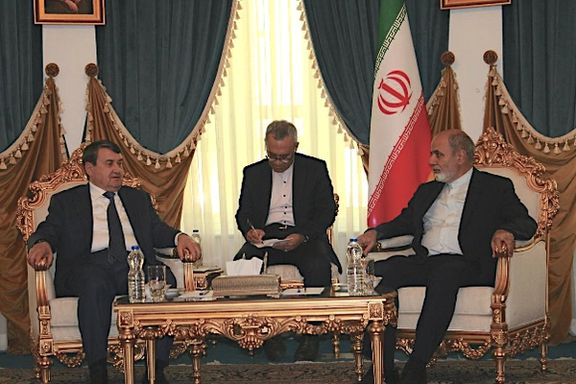
Russian President Vladimir Putin’s special assistant met Iran's Secretary of the Supreme National Security Council (SNSC) in Tehran on Tuesday.

Russian President Vladimir Putin’s special assistant met Iran's Secretary of the Supreme National Security Council (SNSC) in Tehran on Tuesday.
In his third trip to the Islamic Republic this year, Igor Levitin, who is also Russia’s State Council Secretary, met with Ali-Akbar Ahmadian, the new SNSC secretary, as well as Foreign Minister Hossein Amir-Abdollahian.
During the meeting, Ahmadian stressed the need to speed up the implementation of bilateral agreement, including the project to complete the North-South Transport Corridor and memorandums of understanding (MoUs) in the field of oil and gas.
Russia last year pledged to invest tens of billions of dollars in joint energy projects, but similar deals were made in the past without any progress in implementation.
“Expanding relations with neighbors is a strategic policy and the main agenda of the Islamic Republic,” Ahmadian said.
According to the readout of the meeting in Iranian media, they also talked about the agreement on the construction of the Rasht-Astara railway, a strategic transport corridor that connects the existing railways of the two countries and Azerbaijan.
During his meeting with Amir-Abdollahian, Vladimir Putin’s aide also congratulated the Islamic Republic on its full membership in the Shanghai Cooperation Organization, announced earlier in the day.
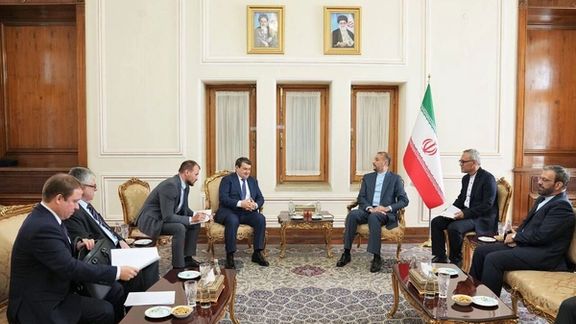
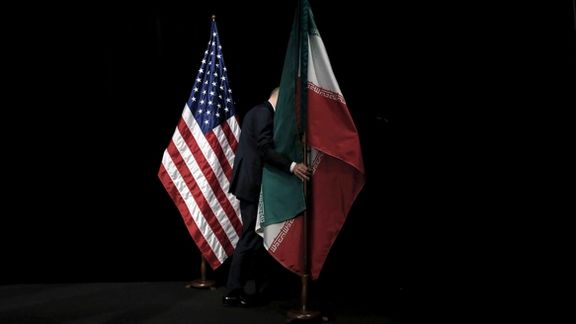
Tensions between Iran and the West are reaching new heights as the fate of nuclear talks hangs in the balance, and missile restrictions are expiring in October.
Multiple reports have been indicating that ‘secret’ talks are underway between Iranian and western officials over the possibility of reaching an “informal, unwritten agreement” or a "political ceasefire" between the two sides.
Iran, for its part, has confirmed that it held indirect talks with the US in Oman. However, these talks have yet to yield concrete results while Iran’s nuclear crisis remains dangerously unresolved, fueling a ripple effect across the region, forcing new alliances with the likes of the Persian Gulf states and new threats from Israel.
According to the IAEA, Iran’s total stockpile of enriched uranium continues to grow and is now 23 times the limits imposed by the 2015 deal, also known as the JCPOA. Accordingly, Iran remains a “nuclear threshold state” since it is in the possession of means to “produce enough material for a nuclear bomb in 12 days.”

The Islamic Republic regime continues to suffer from a crisis of legitimacy, at least internally, as a direct consequence of the bloody crackdown of an unprecedented popular uprising in September 2022, which was triggered by the death in custody of Mahsa (Zhina) Amini.
Therefore, the Islamic Republic’s recent policy of regional détente (i.e., with Saudi Arabia) and its proclivity for negotiations with the US over its nuclear program can be viewed as a Russian-style deception tactic (maskirovka) aimed at confusing and outfoxing its ‘western enemies’ while minimizing the negative international backlash against its inhumane behavior at home and its destabilizing activities abroad, namely in Ukraine.
In a worrying sign of growing tensions between Iran and the West, the UN sanctions on Iran’s ballistic missiles program will be lifted on October 18 as per the JCPOA’s so-called “sunset-clauses”. The expiration of the UNSCR 2231’s missile restrictions on Iran means, at least on paper, that in less than four months, the Islamic Republic regime can legally supply deadlier drones and ballistic missiles to Russia for its ongoing military aggression in Ukraine. The situation for the Biden administration is not irredeemable but could not be worse.
Not only has Iran’s nuclear program reached a point of no return (at least theoretically), the specter of Iran’s possible provision of ballistic missiles to Russia for use in its war against Ukraine, is looming large.
Had the Biden administration adopted a serious and meaningful deterrence strategy vis-à-vis Iran before the Russian invasion of Ukraine, an undesirable status-quo of today could have been prevented in the first place or it could have, at least, been managed in a much more timely, less costly, and effective manner.
For so long, the Biden administration and European powers hesitate to activate the “snapback” mechanism of UN Security Council Resolution 2231 against Iran, fearing that such a move could dissuade Tehran from engaging in nuclear talks and/or prompt the regime to opt for a dangerous nuclear escalation.
The reality is that absent a meaningful deterrence strategy vis-à-vis Iran, the West has in fact created a catch-22 situation from which it cannot escape without sustaining relatively high costs.
Simply put, if “snapback” is activated, Iran is likely to resort to regional and nuclear escalation. Conversely, if the mechanism is not activated, the clerics would rejoice in their notion of “western capitulation” to Tehran, and use every opportunity to threaten the west with more weaponry for Russia in Ukraine war while enjoying the status of a “nuclear threshold state.”

More than 16 months into the Ukraine war, Tehran continues to transfer kamikaze drones, including Shahed 136s to Russia in spite of EU/US sanctions on Iranian entities involved in the drone industry.
The threats posed by the Islamic Republic are hybrid in nature, in the sense that they encompass a wide variety of threats such as nuclear, drones, ballistic missiles, cyber and overseas terror operations against dissidents.
Effective and enduring deterrence against these hybrid threats requires the Biden administration to avoid short-term remedies that seek only to kick the Iranian nuclear can down the road. The US should, instead, adopt a comprehensive and all-encompassing strategy vis-à-vis Iran. Putting off solving Iran’s nuclear crisis is not the solution.
It was thanks to the Ukraine war that European countries became aware of some of the oft-ignored threats of the Islamic Republic beyond its borders.
Imagine a future war between the US and China over Taiwan and Europeans at the horns of a dilemma to choose between the US (their biggest military ally) and China (their biggest economic partner). Imagine the worst-case-scenario whereby Iran-made drones would fly over some European cities in support of China and as a leverage against the United States.
While Putin’s Russia is seen as the West’s foremost threat, the United States and European powers should not underestimate the hybrid threats of the Islamic Republic regime.
Opinions expressed in the analysis are not necessarily the views of Iran International
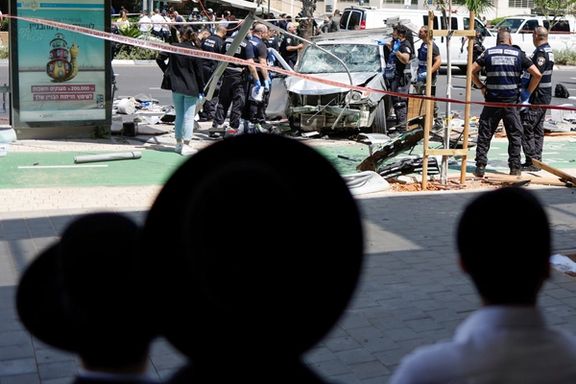
Media affiliated with Iran’s Revolutionary Guards are lauding a car-ramming and stabbing attack against civilians in central Tel Aviv as a “martyrdom operation".
IRGC-affiliated Tasnim news agency published a video and several photos of the incident and praised the 20-year-old Palestinian assailant who was shot dead by an armed civilian as a “martyr". Hamas' official channels hailed him as their operative.
The Palestinian from the West Bank, rammed a pickup truck into pedestrians in Tel Aviv and then went on a stabbing rampage, chasing people knife in hand and wounding eight people on Tuesday.
Hamas claimed the assassin, who entered Israel on a medical permit, struck in Israel's commercial capital in retaliation for the ongoing military raid in the flashpoint West Bank town of Jenin, in which 10 Palestinians have been killed during clashes.
In a statement, Hamas described the attack as a “heroic operation” and “an act of self-defense in the face of the ongoing Zionist massacre in Jenin, the crimes of displacement, killing and destruction executed by occupation forces."
Israel sent drones to strike targets in a militant stronghold in Jenin early Monday and deployed hundreds of troops in the area. The attack set off a gunbattle lasting into the morning. Israeli forces have remained inside the Jenin refugee camp.
The incursion took place two days after the Islamic Jihad's Secretary-General Ziyad al-Nakhala said that anti-Israeli actions in the West Bank reflect Iranian Supreme Leader’s directives.
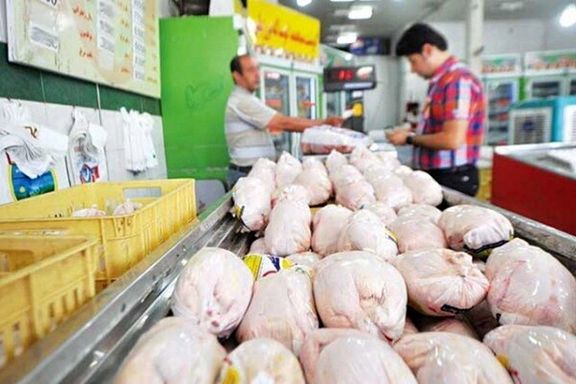
A man was killed in Iran on Monday following a quarrel between a customer and a salesman over the price of chicken as soaring food prices cause chaos across society.
According to the police in Chalus, the murderer was arrested at the scene. He had attacked the salesman with a knife, and he succumbed to his wounds on the way to the hospital.
The price of chicken has soared across Iran in recent weeks, hitting about 1,000,000 rials – or about $2. An ordinary worker in Iran makes about $5 a day.
In a similar fight in January, another man was killed over the price of meat products.
Unable to control the inflation and the rising prices, the government usually announces maximum prices for food stuff and goods, but the official figures are so unreal that businesses ignore them and trade with the real market value, leading to conflicts between customers and sales staff.
In recent years, various reports have been published about the increase in the price of meat, and the decrease in consumption of high-protein foods in Iran.
The government of Ebrahim Raisi has promised to deliver meat and chicken to the people at an "approved price", but the government has made many similar promises in the past though failed to deliver.
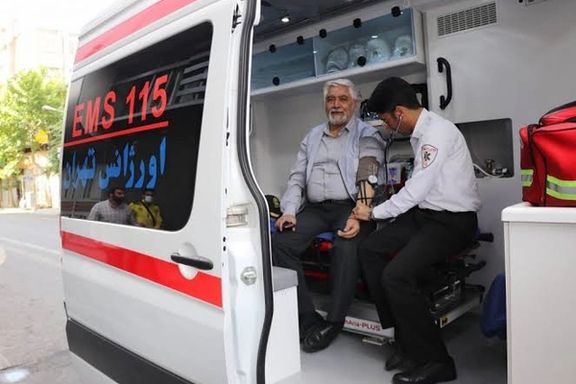
Iran has announced plans for women-only ambulances, leading to criticism by several officials and raising fears for women's safety.
Nahid Khodakarmi, the former head of the Health Committee of the Tehran City Council, warned that the regime's latest plan to separate genders in the emergency room has no other result than "wasting resources, imposing costs and disorder".
She described it as “harmful, time-consuming, and costly", risking women's access to emergency healthcare in the most vulnerable times.
After the head of the country's emergency department, Jafar Miaadfar, announced the new plan for both emergency room and ambulance segregation, Khodakarmi called it a new area of gender segregation.
"Emergency services are not segregated by gender anywhere in the world," she said on Monday. "I don't know the reason behind emphasizing on gender segregation in different areas of the healthcare system .... gender segregation in the general sense is not possible in the emergency room."
Miaadfar announced on Saturday that in the new special ambulances for women, the ambulance driver will be a man, but both technicians will be women.
Defending the decision, Miaadfar said the measure was approved by the Supreme Council of Health in a session with President Ebrahim Raisi in attendance, highlighting that the plan has been implemented in several cities and will become operational throughout the country’s metropolitan areas in the near future.
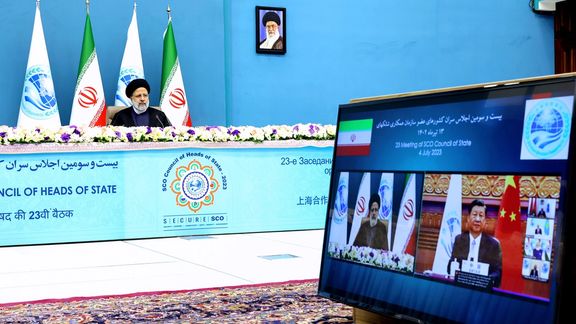
Iran joined the Shanghai Cooperation Organization (SCO) during the group’s virtual summit Tuesday, representing a foreign policy achievement amid its isolation.
This is the first time Tehran joins a regional pact since the 1979 revolution and the establishment of the Islamic Republic.
The SCO also known as the Shanghai Pact is a Eurasian political, economic and security alliance formed in 2001 with Russia, China, Kazakhstan, Kyrgyzstan, Uzbekistan and Tajikistan, with one of its goals being cooperation against extremism. India and Pakistan joined the pact in 2017 and Belarus is also slated to become a member.
Iran, which has become more isolated from the global economy since the United States imposed sanctions in 2018, hails its membership in SCO as an achievement for its Eastern oriented foreign and economic policy.
The SCO also seeks to expand its influence by accepting more members, although two of its biggest members, Russia and Iran face more diplomatic and economic isolation than ever.
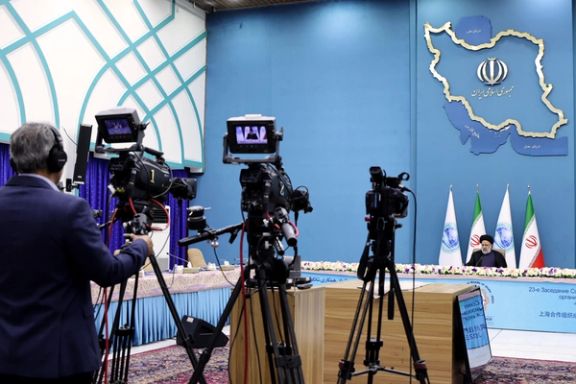
The summit Tuesday was hosted by Indian Prime Minister Narendra Modi, who emphasized the original mission of the organization to jointly fight terrorism. He also said the world is embroiled in disputes, tensions and the impact of the pandemic and global food, fuel and fertiliser crises are big challenges for all countries.
"We need to think together that are we, as a group, capable of meeting the expectations and ambitions of our people? Are we capable of facing modern challenges?" Modi said. "Is SCO becoming a group that is completely ready for the future?"
Russian President Vladimir Putin, China’s President Xi Jinping, Pakistani Prime Minister Shehbaz Sharif and leaders of four central Asian countries took part in the online proceedings as well as Iranian President Ebrahim Raisi.
Although Russia and Iran claim SCO will reduce Western influence and can be a vehicle for replacing the US dollar in international trade, Modi visited the United States in June and received a warm welcome.

China does offer trade in its currency yuan, but that is mostly helpful in bilateral transactions with Beijing. Neither the Chinese yuan nor the Indian rupee are considered global hard currencies like the US dollar or the euro.
Also, it is debatable whether Iran’s membership will add much to the influence SCO hopes to have, while Russia has also become seriously weakened not only by sanctions, but also by its invasion of Ukraine and the recent mutiny by the mercenary Wagner group.
President Vladimir Putin reassured others in his address to the summit of Russia's stability and unity.
"The Russian people are consolidated as never before," Putin told the virtual meeting.
"Russian political circles and the whole of society clearly demonstrated their unity and elevated sense of responsibility for the fate of the Fatherland when they responded as a united front against an attempted armed mutiny."
Putin's emphasis on Russia's unity at a meeting with key allies appeared to show how keen he is to remove any doubts about his own authority on the world stage after the short-lived mutiny led by Wagner mercenary founder Yevgeny Prigozhin late last month.
Russia and Iran constantly speak of countering US unilateralism, but the fact is that Europe appears united with the United States in countering Russia’s military adventure and putting pressure on Iran.
China has also been threading carefully and so far, a substantial Chinese backing for the Russian war effort has not materialized.
In Iran’s case, China is buying illicit Iranian oil shipments in violation of US sanctions, but remains unclear how much it pays in hard currency, since Tehran is facing a serious financial and economic crisis.